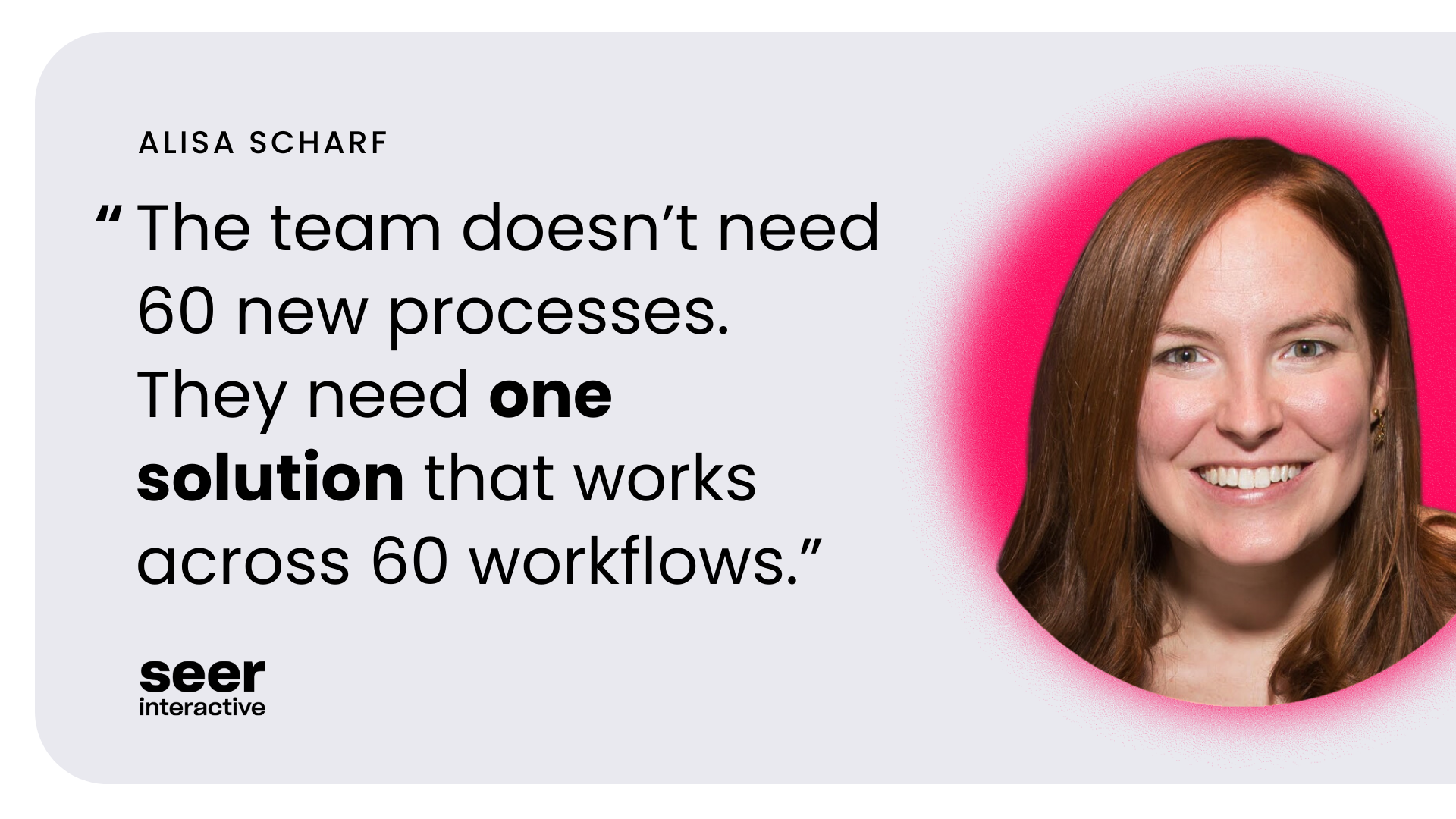Prefer to listen instead of read?
Click the play button below to listen to a narration of this article
Post originally written on 8/3/2021. Updated and audio added on 2/22/2023.
Any type of rejection is tough. Investing time, effort, and emotional stock into an exciting opportunity and just like that— Poof! You're back at square one and feeling defeated.
As a Sr. People Ops Manager at Seer, I have to communicate hiring decisions to candidates and unfortunately, it often entails being the bearer of bad news. Over the last 6+ years, I’ve sadly had to reject thousands of applicants and while it can be a bummer, I remain fascinated with the wide range of candidate responses.
What may come as even more of a shock... the candidate’s response to getting rejected is one of the largest contributing factors in our willingness to reconsider them for future roles at Seer.
Wait...so, you're telling me that you ended up hiring candidates who were previously rejected by Seer? Yep! In this post, read a recruiter’s perspective on the do’s and don’ts of navigating rejection and how to maximize your chances of getting hired the second time around:
Part I: How to Process Initial Rejection
Do: Take Time to Process Before Immediately Responding
We’ve all sent a heated text or email that we later regretted— don’t take that chance when it comes to your career. Resist the urge to respond right away because you may have a change of heart, once you’ve cooled off a bit. Chances are your initial reaction may be emotionally-fueled and you could end up saying something that you regret in the heat of the moment.
Allowing the decision to sink in and processing the feedback may even help you to determine that the role and/or company wasn’t the best fit for you anyway. Try venting to a trusted friend, sweating it out at the gym, or journaling BEFORE you respond. Then approach the conversation with a clear head.
Respond within 24-48 hours, it shows that you were genuinely invested in the opportunity. Otherwise, the team may think you’ve gone dark, which isn’t the best look and can be jeopardizing to future opportunities.
Don’t: Burn Bridges
If you’re a big believer in Career Karma like myself, you know having bad blood with a company could bite you in the butt somewhere down the line. Resist the temptation to pull a ‘Rambo, your actions have a ripple-effect and the long-term consequences could come back to haunt you.
Let’s say two years later, you’re considering a role at a different company, only to realize that the hiring manager is the same person who interviewed you for that previous company. If the hiring manager remembers that heated exchange, it may tarnish your reputation with this new company.
Needless to say, an unprofessional outburst could cost you big-time in unexpected ways for years to come.
Do: Request Feedback with the Intent of Understanding Not Refuting
Semantics and tone can make or break you when it comes to requesting interview feedback. Speaking from the HR-perspective, candidates who ask for feedback and actually end up implementing the advice win major brownie points in my book!
Our team always shares interview feedback and most employers will too, if you approach the request appropriately. In fact, companies with feedback-driven cultures, like Seer, folks have to be receptive to constructive criticism, in order to continuously improve.
If you need to request interview feedback from an employer, emphasize that you’re eager to learn and improve from the experience. If they’re willing to shed light on their decision, accept the feedback with grace and gratitude, even if you aren’t 100% aligned on the reasons they provided.
And whatever you do, never initiate a back and forth debate. If the Recruiter emails you interview feedback, do NOT respond back to each bullet-point with a rebuttal— they're likely forward it to the hiring manager and it'll reaffirm their decision to cut ties.
While it can be a tough pill to swallow, constructive feedback is your friend, regardless of whether or not you intend to reapply to that particular company in the future. At the very least, it’s beneficial to understand how others perceive you.
If you’re willing to keep an open mind, it’s an opportunity for you to make adjustments prior to future interviews and get one step closer to securing your dream job.
Remember, it’s harder and more time-consuming to provide meaningful feedback to a candidate after an interview. When a company is willing to share feedback, it’s an indication that they genuinely care about their team-members and prospective employees alike.
Don’t: Be Unresponsive
Leaving the Recruiter ‘on read’ may even reaffirm their decision not to hire you. Even though you’re understandably bummed about not getting the job, being unresponsive doesn’t go unnoticed.
Yes, you busted your butt preparing for the interview, but the interviewers also took time out of their regular work-schedules to meet with you. At the very least, it’s a sign of courtesy to thank them for the time-investment, even if you don’t agree with the final verdict.
Part II: How to Re-Engage with Potential Employer
Everyone loves a comeback including Seer! In fact, several of Seer’s top-performers didn’t get hired the first time that they applied to Seer. So, how’d they keep the door open with Seer and land the job the second time around?
They leveraged Seer’s feedback to gain additional experience and provided tangible evidence of progress.
"I initially applied to Seer right after graduating college. Even though I didn't get hired at that point, I was encouraged to reapply, once I gained more hands-on, digital marketing experience. I spent the next 1.5 years working at another digital agency, reading industry blog-posts, and leveling up my SEO skills. Fast forward to October 2018 and I was hired as a Seer SEO Associate in the Philadelphia HQ"

Aoife Laughlin, SEO Manager
If you don’t get hired the first time around, you still have another shot, BUT it’s important to have a purposeful plan of attack.
Do: Ensure Ample Time has Passed Before Reaching Out
Realistically, it’s near-impossible to make any significant self-improvements in a matter of weeks. If you prematurely reach out to be reconsidered, it may seem like you didn’t absorb the feedback.
I’d recommend waiting at least 3-6 months before circling back to a company that turned you down.
Do: Leverage your Warm Connections
Since you’ve already gone through the interview process, try to re-engage your HR point-of-contact. Ideally, you’ll want to circle back with the individual who provided you feedback to say thank you and humble-brag about the skills you’ve gained.
Earn points for attention-to-detail by recalling specifics from your previous conversations with that individual. It can be personal or professional— either way, it’ll show that you’re a thoughtful person and active-listener.
(i.e. “How did your wedding go— you said it was in May, right?” “Hope that Seerfest was a success...I remember everyone was setting up for that when I came in for my Panel Interview”)
Do: Address Weaknesses to Show Self-awareness
No, that doesn’t mean you should be self-deprecating and downplay your qualifications. Instead, be forthcoming about the feedback you received last time and thank them again for sharing such specific and actionable advice. It shows that you’re humble, willing to learn, and able to make adjustments.
Do: Bring Examples of How you’ve Improved
This is when Interview Feedback comes in handy. Don’t ruin your second shot at redemption by coming into that conversation unprepared— most employers won’t be inclined to give you a third chance.
Knowledge is power. Therefore, you should be more confident heading into this conversation because you’ll be able to anticipate the areas that they’ll dig in on. While there may be some overlap in the discussion, most employers won’t waste time re-assessing your qualifications within the areas that they were already vetted & deemed acceptable.
Prepare 3+ detailed examples to highlight how you’ve progressed in the areas that needed improvement. Aim to provide specific and quantifiable data, when applicable.
(i.e. DO share the online-course that you took to improve your Local SEO chops & any professional application of Local SEO. DON’T simply say you’ve been ‘reading up on Local SEO.’)
Do: Prove that You've Kept Up with the Company
Whether you’re trying to revisit conversations with a recruiter or rekindle things with your ex, it’s important to make the other person feel special. Personally, I appreciate when former applicants tell me that they recently attended a Seer webinar or leveraged our Screaming Frog Guide.
Taking the time to include call-outs about the company will increase your chances of resuming the interview process with them. Plus, it proves that your admiration for the company wasn’t exclusively tied to their willingness to hire you.
Ask if/how the role has changed since you previously interviewed. Questions pertaining to changes since your previous conversations will show that you’re curious to learn more about the strategic direction of the company and how success is evaluated in the role.
Part III: Onward & Upward
Don't: Dwell in the Rejection
While I wish I could guarantee a job offer to anyone who follows these guidelines, that’s definitely not the case. Unfortunately, you’ll never have all the information in front of you because employers don’t necessarily disclose every single piece of negative feedback from the interview process.
They might be concerned about your communication-style clashing with the team, and while it may be discouraging, employers tend to believe that personality-traits are set-in-stone. To put it bluntly, if they were concerned about your alignment with their values, there’s not much you can say to prove them wrong.
Maybe they told you that the role required stronger Google Analytics skills, but they withheld the fact that the interviewers also noted your tendency to talk over people. If you’ve made a compelling case for how you’ve become a Google Analytics SME and the company is still unwilling to hire you, there might be more to the story.
Do: Look at the Wins
Don’t dwell on the initial rejection because there could be long-term wins on the way! If you’re genuinely interested in maintaining a relationship with that company, there are plenty of ways to partner with them moving forward.
Maybe you weren’t the best fit for a full-time position, but the company would hire you as a Contractor in a heartbeat. That’s something you could proactively propose as an option up-front. Additionally, Seer’s People Team is frequently asked to refer strong digital talent to our partner agencies, clients, and former colleagues.
In conclusion, getting rejected by a company can be discouraging, but it shouldn’t be your demise. If you’d like to be considered for future opportunities with that employer, it’s imperative to leave things on a positive note. If you’re patient and purposeful in your approach, you can easily resume the interview process with your dream-company.
We're Hiring!
Good news-- Seer is hiring for a ton of roles across the entire agency. Luckily, all of these positions are eligible to sit remote, as well. Whether you’re a brand new applicant or looking for a shot at redemption with Seer, we’d strongly encourage you to apply!
Join our Career Roundup Community and Sign-up for our Newsletter
Careers Tips, Industry Updates, & More




